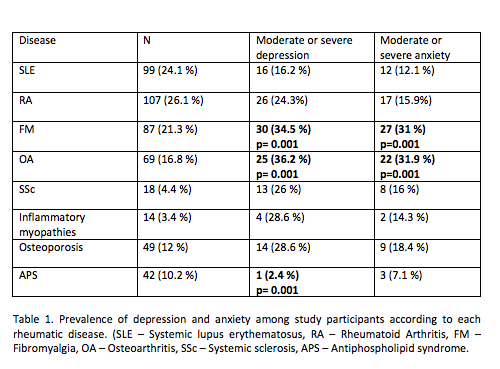Session Information
Session Type: ACR Poster Session B
Session Time: 9:00AM-11:00AM
Background/Purpose: Anxiety and depression are often present in chronic rheumatic diseases. Recognition of these psychological disorders is fundamental for proper patient management. The absence of screening leaves more than >50% of patients with depression unidentified. Patient Help Questionnaire-9 (PHQ-9) and General Anxiety Disorder-7 (GAD-7) are two validated self-applied questionnaires that are appropriate to assess the presence of, depression and anxiety, respectively. Objectives. 1) To assess the prevalence of depression and anxiety in a hospital based outpatient Rheumatology clinic and 2) To provide the attending physician with appropriate instruments that allow a rapid orientation on the psychological status of her/his patient.
Methods: Consecutive patients that attended our outpatient Rheumatology clinic from March to June 2016 were invited to participate in this cross-sectional study. Participants filled out PHQ-9 and GAD-7 in the waiting room. The prevalence and severity of anxiety and depression were calculated for the most prevalent diagnoses.
Results: A total of 410 patients were recruited; 339 (82.8%) were female. Overall, 191 (46.6%) patients reported depressive symptoms (PHQ-9 >5). Of them, 87 (21.2%) were classified as having moderate depression or higher (PHQ-9 >10). Prevalence of depression and anxiety among study participants according to each rheumatic disease is depicted in Table 1. Prevalence of moderate or severe depression was significantly different among various rheumatic diseases (p = 0.001). Regarding anxiety symptoms, they were reported in 168 (40.7%); 67 (16.2%) of them had moderate or severe anxiety.
Conclusion: This cross-sectional study shows that anxiety and depression are frequent in the Rheumatology clinic. We demonstrated that the use of a self-applied screening tool can help clinicians to properly detect depression and anxiety associated with diverse rheumatic diseases. Special attention should be paid to patients with fibromyalgia and osteoarthritis. 
To cite this abstract in AMA style:
Perez-Garcia LF, Rivera V, Moreno Ramirez M, Loaiza Felix J, Martinez-Martinez LA, Vargas Guerrero A, Silveira LH, Amezcua-Guerra LM, Martínez-Lavín M. Screening for Depression and Anxiety in an Outpatient Rheumatology Clinic Using Validated Self-Applied Questionnaires [abstract]. Arthritis Rheumatol. 2016; 68 (suppl 10). https://acrabstracts.org/abstract/screening-for-depression-and-anxiety-in-an-outpatient-rheumatology-clinic-using-validated-self-applied-questionnaires/. Accessed .« Back to 2016 ACR/ARHP Annual Meeting
ACR Meeting Abstracts - https://acrabstracts.org/abstract/screening-for-depression-and-anxiety-in-an-outpatient-rheumatology-clinic-using-validated-self-applied-questionnaires/
